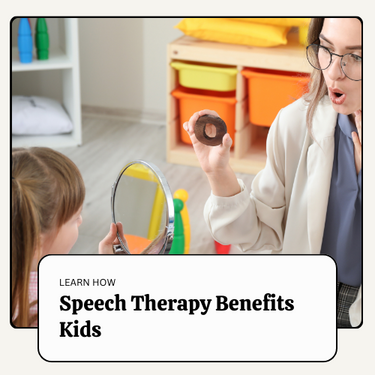
When people think of Speech-Language Pathology, or Speech Therapy, they might imagine a child with a lisp who works with a specialist to learn how to speak clearly. While working to resolve lisps, stutters, fluency, and voice pitch abnormalities are certainly examples of Speech Therapy, Pediatric Speech-Language Pathology pertains to so much more than just speech or communication.
Pediatric Speech-Language Pathology (sometimes called Speech Therapy or Speech-Language therapy) provides therapeutic treatment to help infants, children, and adolescents articulate correctly, swallow properly, feed safely, and improve language and communication skills.
Children who are born with a cleft palate, cerebral palsy, or any disorder that impacts the brain, nerves, or muscle’s ability to speak, swallow, or feed can benefit from Pediatric Speech-Language Pathology. Speech Therapy is can also be beneficial for children with Down Syndrome and Autism Spectrum Disorder (ASD), because it helps improve language and conversational skills.
Who Provides Speech Therapy?
A Pediatric Speech-Language Pathologist is a healthcare specialist trained in assessing and administering healthcare with infants through 18-year-old children who have trouble swallowing or feeding, developmental language disorders, and/or speaking impairments. A Pediatric Speech-Language Pathologist will help your child feed, swallow, and communicate effectively by working with them to develop swallow and speech muscles to improve their feeding, swallowing and communication abilities.
Pediatric Speech-Language Pathologists will also work with caretakers to provide them with the tools required for improving feeding and/or communication. Working with parents is essential because practicing therapeutic language methods in the child’s natural home environment is what ensures lasting impact of pathology care. For this reason, it is very important for caretakers to be fully aligned with the Speech-Language Pathologist on what language strategies can be reinforced in the home environment to further support the child’s development.
Benefits of Speech Therapy
The ability to speak and communicate clearly is not only an essential component of the human experience, but it is also necessary for safety. As such there are many short-term and long-term benefits of Speech Therapy. Some of the more noteworthy benefits include:
Find a Speech Pathologist
If your child has difficulty with swallowing or feeding, is experiencing a speech delay, struggles to communicate, or has trouble articulating certain sounds, do not wait to get help. The time between birth and three years of age is specifically a critical time of mental growth, and this is the best window of opportunity for speech therapy to capitalize on communication development potential.
Visit www.KidsTherapyFinder.com and search our directory to find a Pediatric Speech Pathologist for your child today.

Sign up for our newsletter to get instant access to parenting resources sent directly in your inbox!
